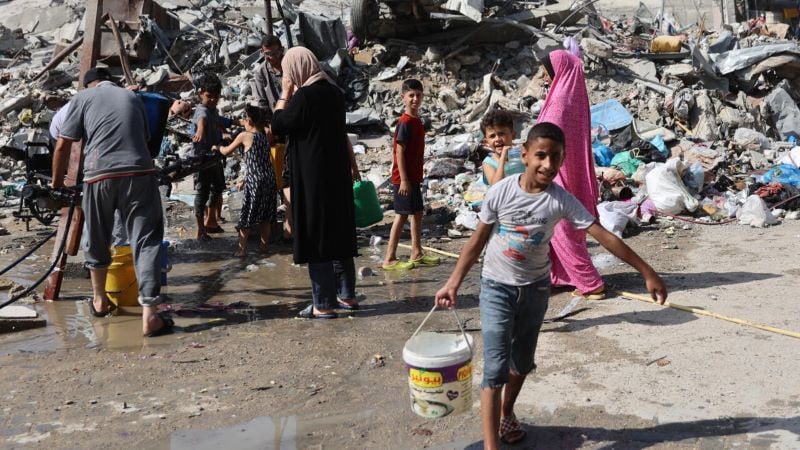GAZA: According to Shanbari, the majority of the wells close to his temporary shelter in the Jabalia camp had been damaged.

Furthermore, after more than nine months of fighting that destroyed Gaza’s infrastructure, the water distribution system hardly functions at all.
Even before the fighting broke out in October, there wasn’t much water, and the majority of it was unsafe to drink. Humanitarian groups claim that the 2.4 million people living there depend on an aquifer that is becoming more and more contaminated and depleted.
In the intense heat, it can take Shanbari four hours to gather the last, putrid supplies.
Carrying buckets, he and his three kids make their way through debris and debris piles in pursuit of a functional faucet or a relief organization line that can be attached to a water truck.
He told AFP, “We are suffering greatly to obtain water.”
Since intense fighting between the Israeli army and Hamas started out in Jabalia in May, according to Shanbari, the situation has gotten worse.
“After the last incursion, not a single well remains,” he stated.
“Weary”
Even before to the conflict, the majority of Gaza’s groundwater was tainted with sewage, according to the UN humanitarian office OCHA. Over 97% of them were dangerous to consume.
The current state of affairs in Gaza is characterized as “catastrophic” by numerous humanitarian organizations.
Palestine residents in Gaza have been telling AFP journalists for weeks about their severe thirst, which sends them into a delirium, their dreams of a cup of tea, and the shame of not being able to wash.
The Shanbari family values water so highly that they make an effort to contain any spills they may find.
They carefully pour the water into basins for dishwashing and pitchers for bathing from the jerrycans they carry home.
The parents claim that their children are ill and that they are “exhausted” from the never-ending battle to obtain the simplest requirements.
“All my children have fallen ill, they’re suffering from kidney failure, jaundice, itching, cough,” stated Shanbari. “I don’t know what to say, and there aren’t even medicines available in the north.”
Huge puddles of sewage, often the size of ponds, blanket the roads not far from the Shanbari residence.
Not functional
Shanbari claimed there wouldn’t be enough fuel in the north to power the pumps required to retrieve the water from a well, even if he could find one.
Fighting and a shortage of fuel are supposedly the other reasons wastewater treatment plants are closing.
The water distribution system in the Gaza Strip is essentially nonfunctional, according to a specialist on the region’s water infrastructure.
He stated that the only way to restart it would be through a truce because access to the stations and wells would require specialists and replacement parts.
On Sunday, the Israeli military argued that the Al-Mawasi humanitarian zone, where it has ordered hundreds of thousands of Palestinians to relocate, has accessible water collection stations.
However, the health ministry in the zone controlled by Hamas reports that 300 people were injured and at least 92 people died in Israeli strikes on Al-Mawasi on July 13. As a result, people are terrified to travel there.
The possibility of resupplying energy from Israel to a desalination facility and a water treatment plant in Gaza has been brought up by Israel, UN agencies, and the Palestinian Authority.
The line is still too damaged to deliver power, according to the local electrical distribution firm.
The October 7 attack on southern Israel by Hamas, which claimed 1,195 lives, the majority of them civilians, according to an AFP count based on Israeli numbers, set off the Gaza war.
In addition, 251 hostages were taken by the terrorists; 116 of them remain in Gaza, 44 of whom the Israeli military claims are dead.
Data from the Gaza Health Ministry shows that at least 39,006 individuals have died as a result of Israel’s retaliatory military action in Gaza, the majority of them were civilians.











































